
The Strawberry Thief William Morris Vinyl Wallpaper Cleo Wallpaper
Find the Best Deals on William Morris Strawberry Thief Drapes at Wayfair. We've Got Everything You Need to Decorate Your Home Like a Pro. Shop Now!
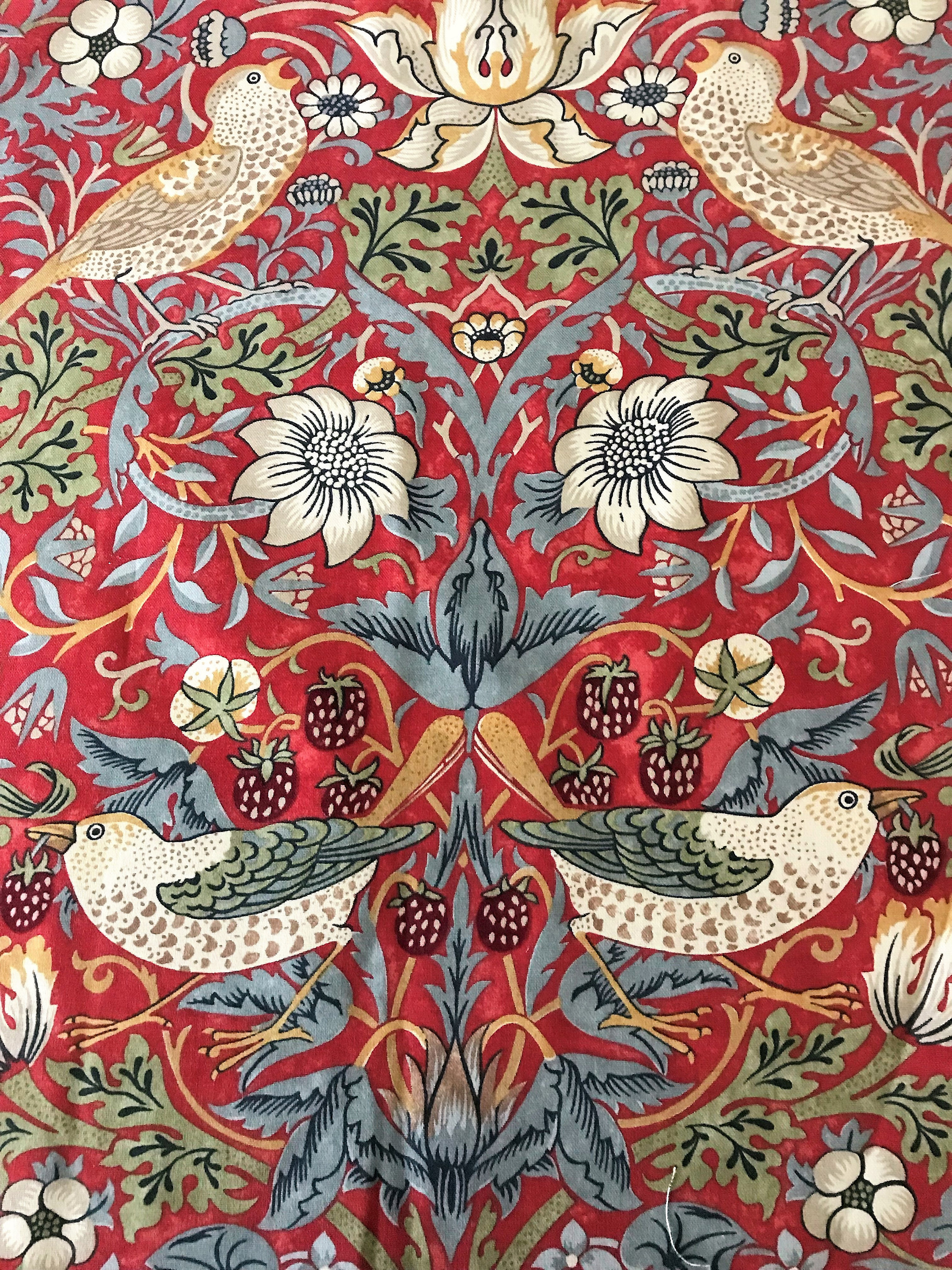
William Morris Fabric Strawberry Thief in red 45cmx 50cm FQ Etsy
With Strawberry Thief, Morris perfected the indigo-discharge process, which required the entire cloth to be dyed blue before it was bleached and block printed, in this case with more colors than any of his other textiles. Video.. William Morris: Designing an Earthly Paradise. The Cleveland Museum of Art, Cleveland, OH (organizer) (October 24.
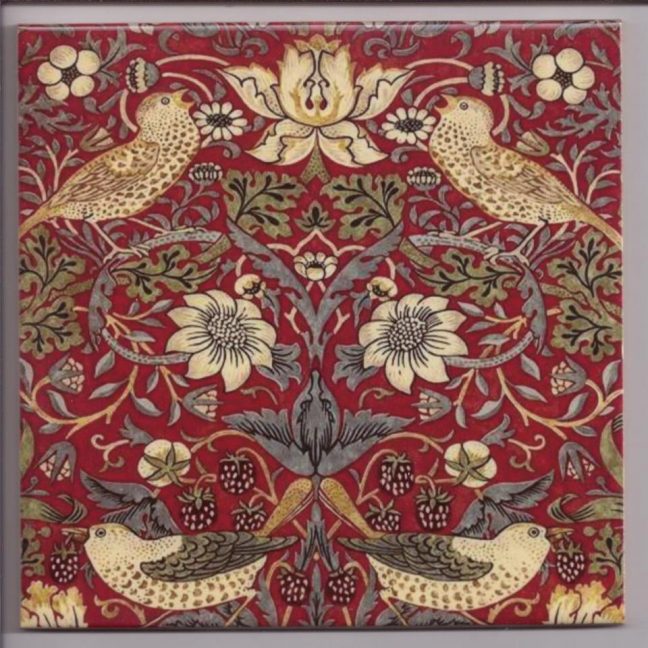
William Morris Strawberry Thief Red Pilgrim Tiles
William Morris (24 March 1834 - 3 October 1896) was a British textile designer, poet, artist, writer, and socialist activist associated with the British Arts and Crafts movement.He was a major contributor to the revival of traditional British textile arts and methods of production. His literary contributions helped to establish the modern fantasy genre, while he helped win acceptance of.
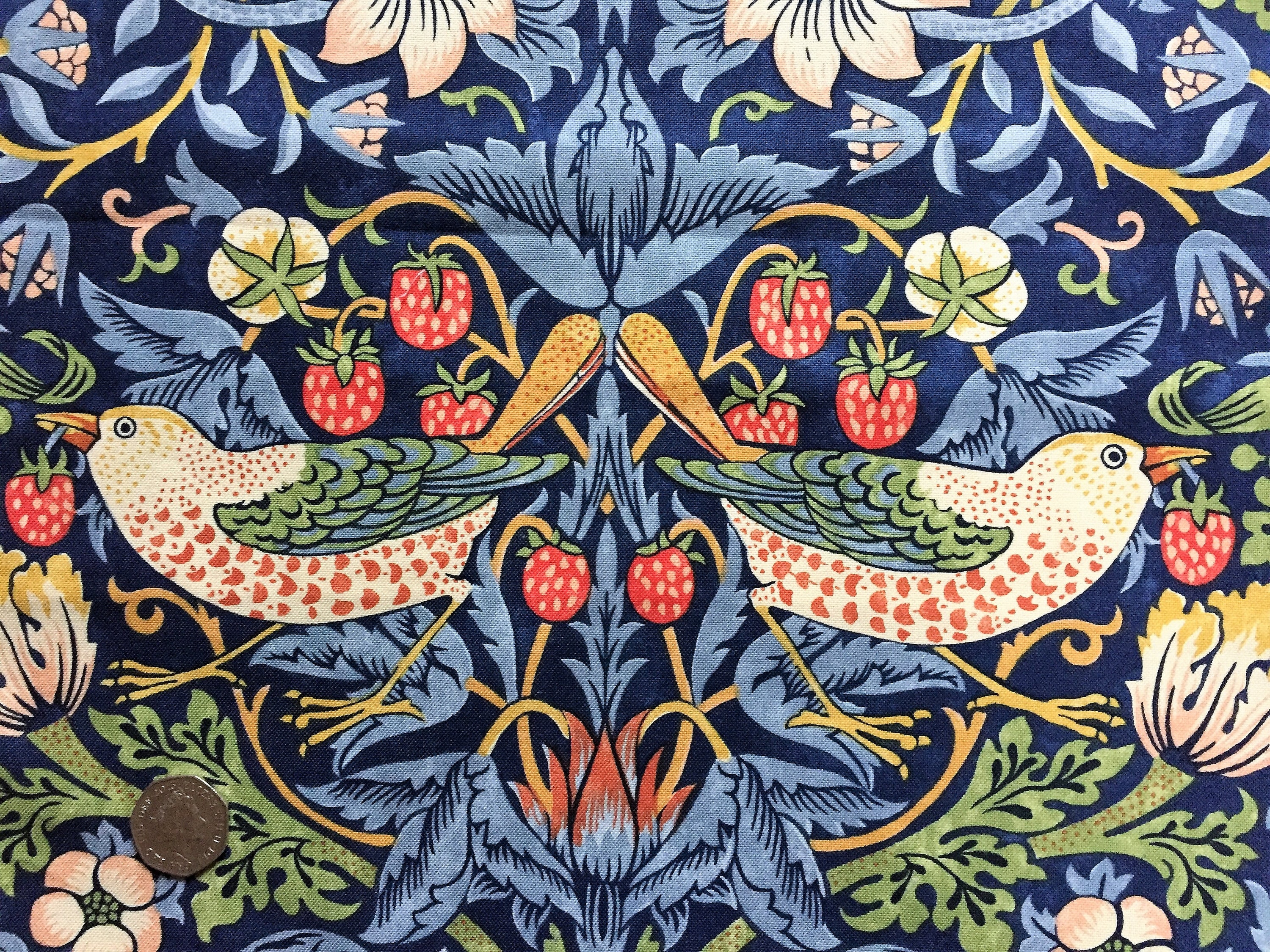
William Morris Fabric Strawberry Thief in Dark Blue 45cmx 50cm Etsy
William Morris was fascinated by textiles and the techniques he needed to master to produce the effects he saw and admired in historical furnishings.. Strawberry Thief, furnishing fabric, designed by William Morris, made by Morris & Co., 1883, England.
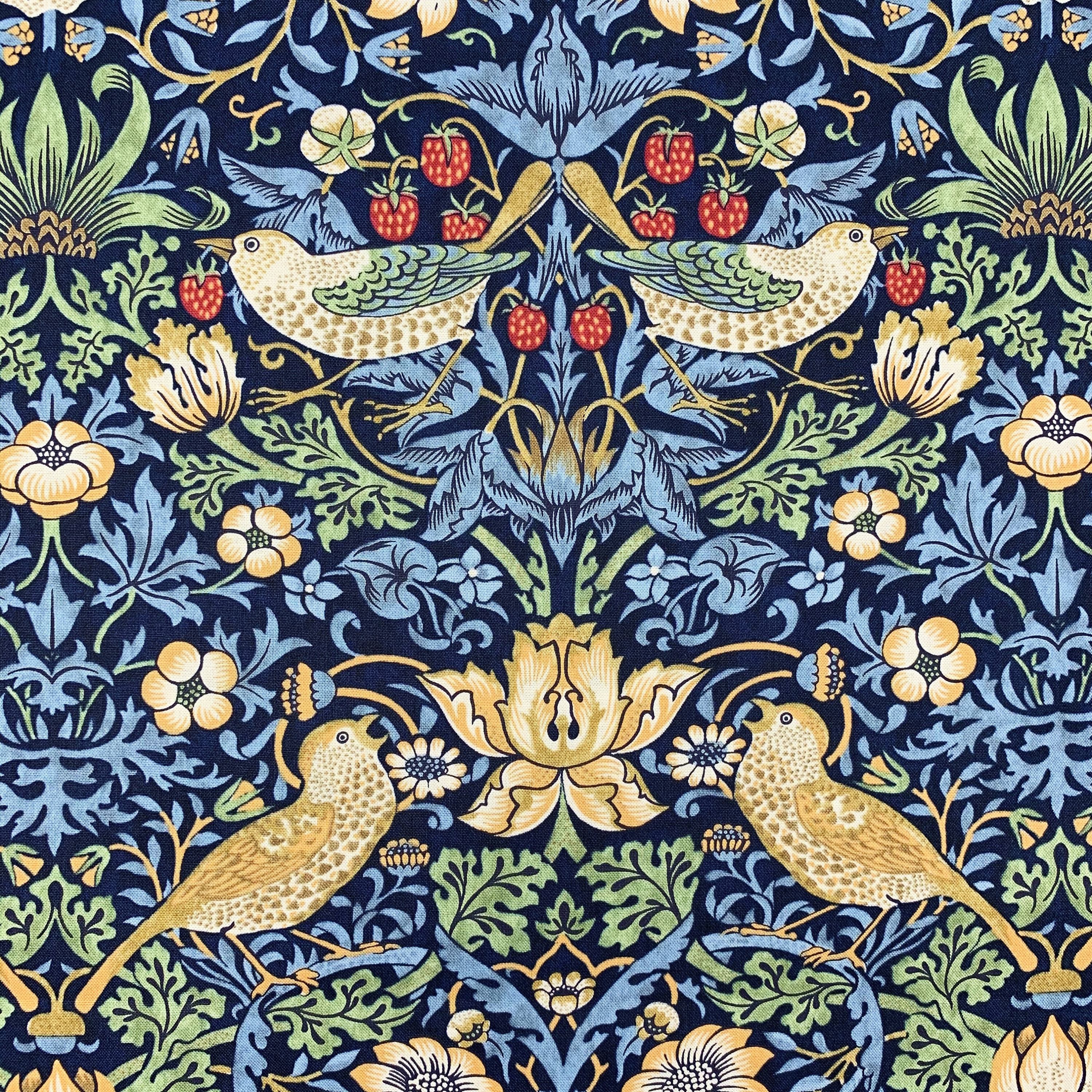
William Morris Strawberry Thief Fabric Art Nouveau Blue Bird Etsy UK
Strawberry Thief pattern with birds, strawberries and flowers. The pattern is in brown, yellow and shades of green, blue and red on a dark blue ground. Dimensions. Height: 60.5cm. Width: 95.2cm. Dimensions checked: Measured; 26/01/1999 by dw to be hung as landscape size - checked with Paul Harrison.

Strawberry Thief Fabric William morris art, William morris wallpaper
Title: Strawberry Thief; Creator: William Morris (British, 1834-1896) Date Created: c 1936; Physical Dimensions: Overall: 88.3 x 99.1 cm (34 3/4 x 39 in.) Type: Textile; Rights: CC0;. Perhaps the most recognizable of Morris's textiles, *Strawberry Thief* celebrates the thrushes in Kelmscott Manor's garden. May Morris remarked, "You can.

William Morris Strawberry Thief William Morris Tiles
Strawberry Thief, c 1936. Designed by William Morris (British, 1834-1896). Plain weave cotton, discharge printed; overall: 88.3 x 99.1 cm (34 3/4 x 39 in.). The Cleveland Museum of Art, Gift of Mrs. Henry Chisholm 1937.696 Perhaps the most recognizable of Morris's textiles, Strawberry Thief celebrates the thrushes in Kelmscott Manor's.
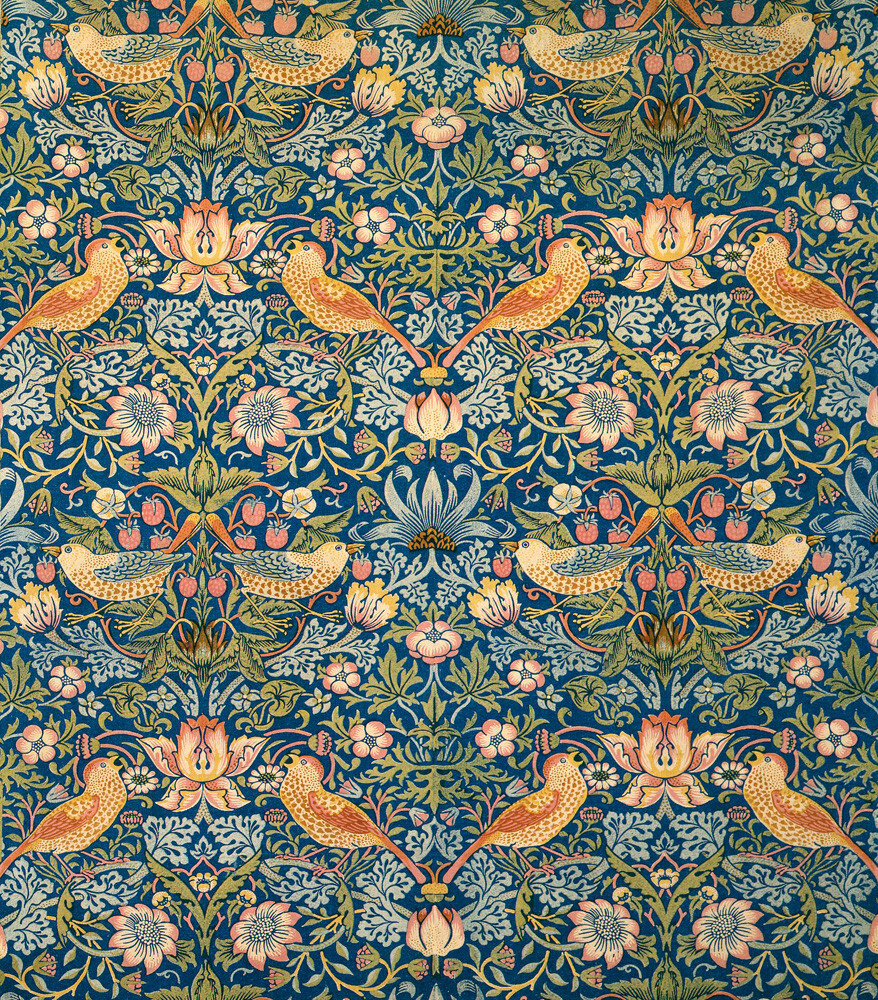
Strawberry Thief Art Print by William Morris King & McGaw
Colors can be modified slightly. From Top Left: Butter Cream, Forest, White, Indigo, Rooster Comb Red, Victorian Blue, Jet, Slate Gray, Wine, Sky and Dragons Blood. Strawberry Thief was inspired by the thrushes stealing strawberries in his garden at Kelmscott Manor. It would become his most popular design. Morris Strawberry Thief tiles in more.
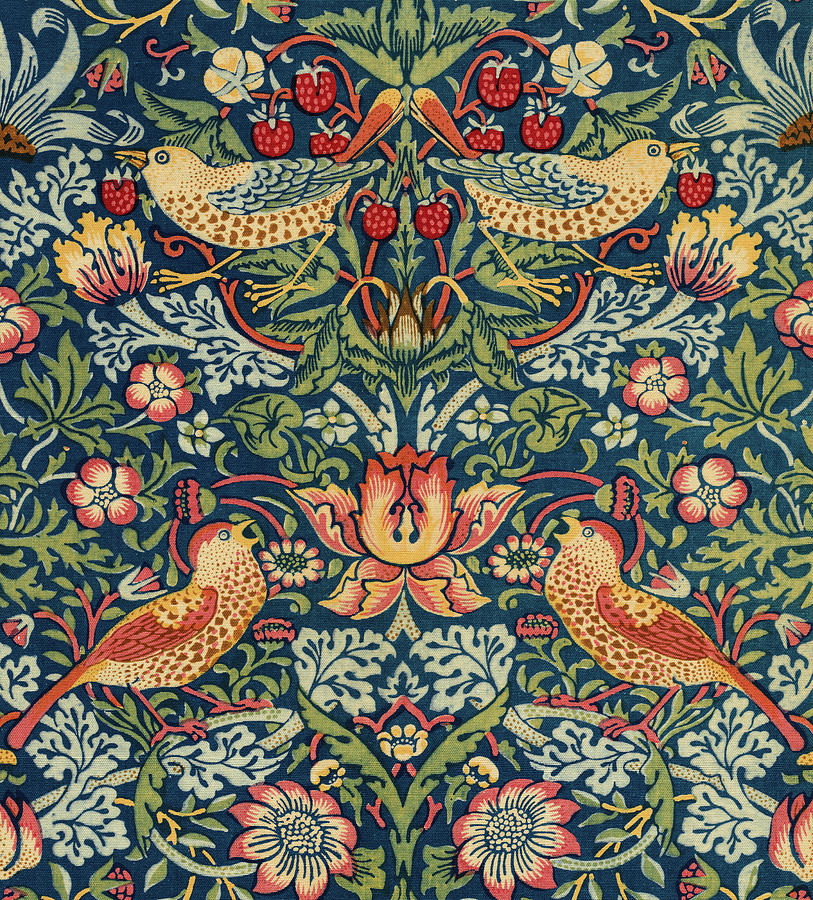
Strawberry Thief, Wallpaper Painting by William Morris Pixels
Strawberry Thief is the best known of Morris's decorative textile designs, one on which he worked for several months before finding a way of printing it successfully. The fabric was intended to be used for curtains or hung along walls, a medieval style of decoration which the artist advocated. The pattern, meanwhile, was based on the thrushes.

Printed Fabric Strawberry Thief by William Morris. Original from The
Title: Strawberry Thief. Designer: Designed by William Morris (British, Walthamstow, London 1834-1896 Hammersmith, London) (registered on May 11, 1883) Manufactory: Merton Abbey Tapestry Works (British, founded 1881) Maker: Workshop of Morris & Company. Date: design registered 1883, printed 1917-23. Culture: British, Merton Abbey. Medium.

"William Morris Strawberry Thief Design 1883 " Canvas Print by RBEnt
William Morris's Strawberry Thief. By 1880 British writer and designer William Morris's internationally known and influential decorative arts and interior decorating firm Morris and Company was producing many products, including embroideries, tapestries, furniture, stained glass, wallpapers, printed and woven textiles, and rugs. In 1881 the.

William Morris Strawberry Thief The Tapestry House Jacquard Woven
Strawberry Thief. Design 1883, made 1883-1917. Designed by William Morris (English, 1834-1896) Produced by Morris & Co., London (English, 1875-1940) Merton Abbey, London (English, 1881-1940) Islamic textiles informed the design of this 19th-century printed curtain. William Morris, a key figure in the British Arts and Crafts Movement.

William Morris Strawberry Thief Blue Pilgrim Tiles
Strawberry Thief is one of William Morris's most popular repeating designs for textiles. It takes as its subject the thrushes that Morris found stealing fruit in his kitchen garden of his countryside home, Kelmscott Manor, in Oxfordshire. To print the pattern Morris used the painstaking indigo dye textile printing method he admired above all forms of printing. He first attempted to print by.

The strawberry thieves pattern (1883) by William Morris. Original from
Strawberry Thief represents a charming story from William Morris' life which would ultimately inspire this design. The 1883 printed cotton furnishing textile now resides within the collection of the V&A Museum in London, UK.. The title refers to a large number of thrushes who would visit his garden at around that time and rudely steal his strawberries.

V&A, William Morris fabric, 'The Strawberry Thief' William morris
Strawberry Thief was and is the most popular of all William Morris patterns to this day, and for good reason. It makes a friendly kitchen or living area pattern without being kitsch or sentimental. The blue central pattern is closest to the original implementation of Morris's design, but his designs invites other colorways and lighter variations.
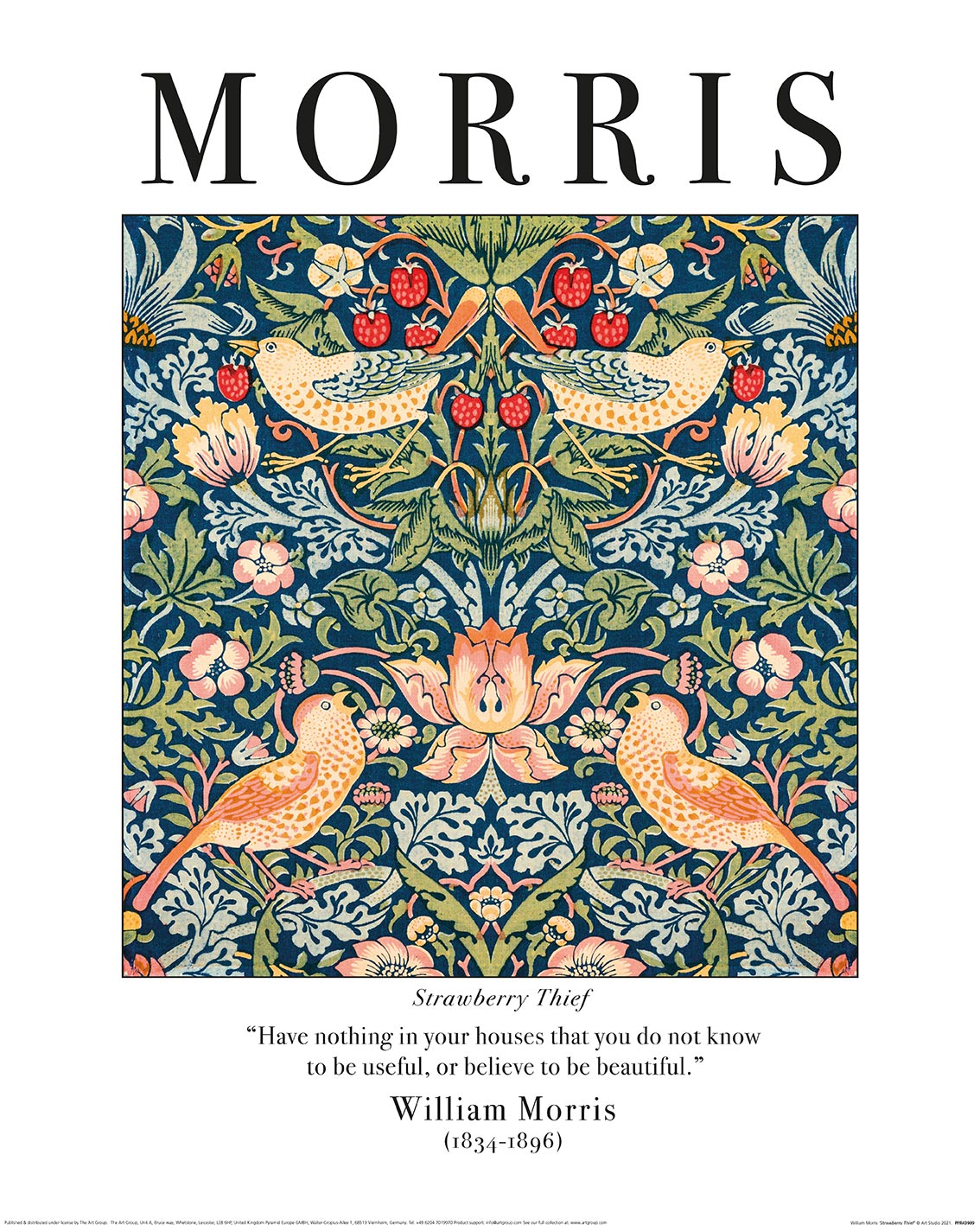
William Morris (Strawberry Thief) Art Print The Art Group
28th July 2014. Strawberry Thief is one of William Morris's most well known repeat design. The process of printing it in 1883 meant it would have taken days to complete the process, and therefore it was one of Morris & Co.'s most expensive cottons. Despite the retail cost, it was one of Morris's most commercially successful prints.